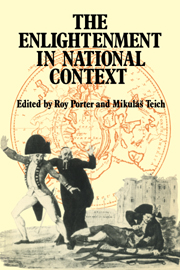Book contents
- Frontmatter
- Contents
- Preface
- 1 The Enlightenment in England
- 2 The Scottish Enlightenment
- 3 The Enlightenment in France
- 4 The Enlightenment in the Netherlands
- 5 The Enlightenment in Switzerland
- 6 The Italian Enlightenment
- 7 The Protestant Enlightenment in Germany
- 8 The Enlightenment in Catholic Germany
- 9 Reform Catholicism and Political Radicalism in the Austrian Enlightenment
- 10 Bohemia: From Darkness into Light
- 11 The Enlightenment in Sweden
- 12 The Russian Enlightenment
- 13 Enlightenment and the Politics of American Nature
- Afterword
- Notes to the text
- Further reading
- Index
9 - Reform Catholicism and Political Radicalism in the Austrian Enlightenment
Published online by Cambridge University Press: 24 September 2009
- Frontmatter
- Contents
- Preface
- 1 The Enlightenment in England
- 2 The Scottish Enlightenment
- 3 The Enlightenment in France
- 4 The Enlightenment in the Netherlands
- 5 The Enlightenment in Switzerland
- 6 The Italian Enlightenment
- 7 The Protestant Enlightenment in Germany
- 8 The Enlightenment in Catholic Germany
- 9 Reform Catholicism and Political Radicalism in the Austrian Enlightenment
- 10 Bohemia: From Darkness into Light
- 11 The Enlightenment in Sweden
- 12 The Russian Enlightenment
- 13 Enlightenment and the Politics of American Nature
- Afterword
- Notes to the text
- Further reading
- Index
Summary
The last decade has witnessed the publication of numerous works on the Austrian Enlightenment. Yet not so long ago it was quite common to question the very existence of an Austrian Enlightenment. Historians belonging to the camp of Catholic conservatism saw the Enlightenment as something totally alien to the genuine Austrian tradition, and therefore presented the eighteenth century as a period when foreign, anti-Catholic influences penetrated Austria and achieved a temporary ascendancy. Historians belonging to the rival anticlerical and liberal camp, which was steeped in the ‘great-German’ nationalist tradition, viewed everything in Austria as a pale reflection of German developments, and therefore presented the Austrian writers of the later eighteenth century as not very successful imitators of Lessing, Wieland and the classicists at the court of Weimar. In both these contexts, the reverses suffered by Joseph II could be logically ascribed to his failure to take the specific conditions of his territories into account, both in what he tried to do and in the speed with which he tried to do it. Now that Austria is emancipating herself from the dual legacy of Catholic conservatism and great-German nationalism, the path seems at last clear to a proper historical assessment of the Austrian Enlightenment and its place in the social and intellectual development of the Habsburg lands.
- Type
- Chapter
- Information
- The Enlightenment in National Context , pp. 127 - 140Publisher: Cambridge University PressPrint publication year: 1981
- 3
- Cited by



